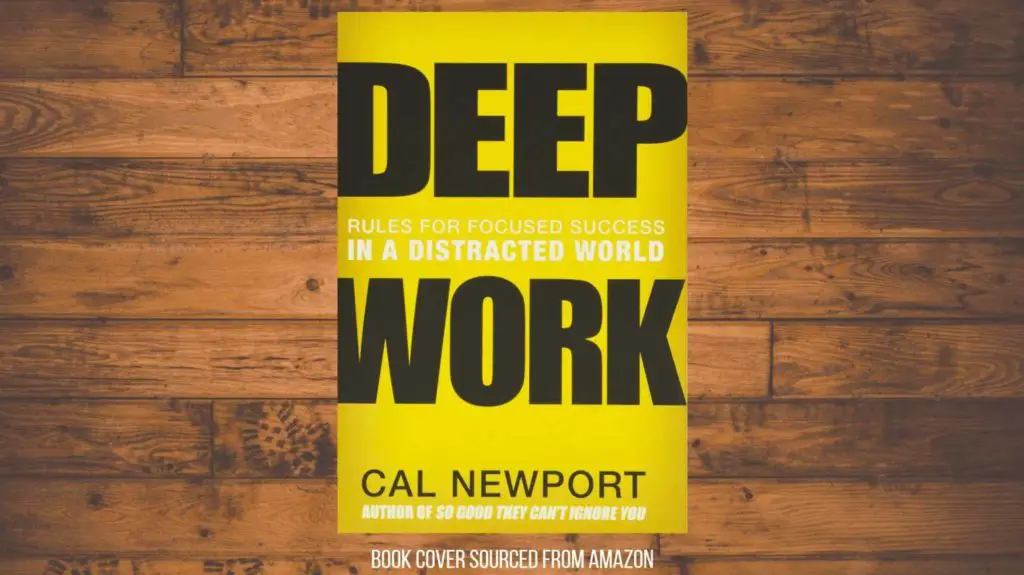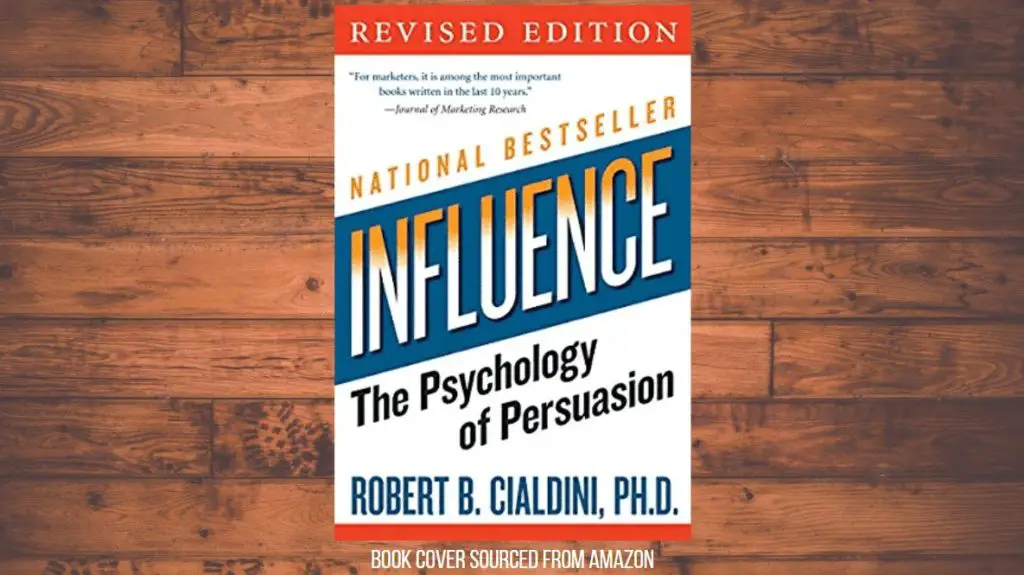This post may contain affiliate links, which means I’ll receive a commission if you purchase through my links, at no extra cost to you. Please read full disclosure for more information.
ABOUT
- Title: Deep Work
- Sub-title: Rules for Focused Success in a Distracted World
- Author: Cal Newport, Ph.D.
- About the author: Cal Newport is a writer with multiple bestselling books and he also runs the popular Study Hacks blog on calnewport.com. He is also an assistant professor of computer science at Georgetown University. He completed his undergraduate degree at Dartmouth and Ph.D. from MIT.
- Pages: 287
- Published: 2016
- Link to book
HIGH-LEVEL SUMMARY
Deep Work is a guide to cultivating intense focus to succeed in the modern, distracted world. To perform deep work entails focusing without distraction on a cognitively demanding task.
This book is broken into two parts. The first part of the book will explain why deep work is valuable, why it is rare, and why it is meaningful.
Cal Newport will share research showing that deep work is necessary to improve your abilities. He will point out how influential figures from distant and recent history were committed to deep work. He’ll open your eyes to the opportunity presenting itself in the “new economy.”
Deep work is becoming rare as it is becoming more important. If you can cultivate this skill, you will thrive. This sort of superpower will enable you to quickly master new things and produce more results in less time.
Part two of the book will lay out tips and training for you to practice deep work.
Cal is a theoretical computer scientist who performed his doctoral training at MIT. Before being hired as a tenure-track professor at Georgetown University, he published four books, earned a Ph.D., and wrote a high number of peer-reviewed academic papers.
He couldn’t have completed those tasks without deep work.
RECOMMENDATION
If you are looking to boost your productivity and reach a new level in your work and in life, Deep Work is the book for you.
You’ll learn how to minimize and/or eliminate the irrelevant shallow work in your life and replace it with deep, meaningful work.
The prescriptive tips on how to implement and enable deep work will benefit you, but I believe you’ll enjoy the first part of the book as well.
Check out this related reading next:
- Book Review: The Productivity Project by Chris Bailey
- How to Stay Focused at Work: 17 Ways
- How to Learn More and Learn Faster: 20 Things to Do
- Detailed Morning Routine of a Young Working Professional
- Book Notes: Essentialism by Greg McKeown
TOP 25 TAKEAWAYS
In no particular order
1. Deep Work: Professional activities performed in a state of distraction-free concentration that push your cognitive capabilities to their limit. These efforts create new value, improve your skill, and are hard to replicate.
2. Shallow Work: Noncognitively demanding, logistical-style tasks, often performed while distracted. These efforts tend to not create much new value in the world and are easy to replicate.
3. A commitment to deep work is a common theme in the lives of many other figures from distant and recent history.
4. The rise of smartphones, networked computers, and communication services like e-mail, SMS, and social media have fragmented people’s attention.
5. If you spend enough time in shallow work, you may permanently reduce your capacity to perform deep work. Deep work is a skill.
6. Our work culture’s shift toward the shallow is exposing a massive economic and personal opportunity for the few who prioritize depth.
7. We have an information economy that’s dependent on complex systems that change rapidly. To remain valuable in our economy, you must master the art of quickly learning complicated things.
8. The Deep Work Hypothesis: The ability to perform deep work is becoming increasingly rare at exactly the same time it is becoming increasingly valuable in our economy. As a consequence, the few who cultivate this skill, and then make it the core of their working life, will thrive.
9. In this new economy, three groups will have a particular advantage: those who can work well and creatively with intelligent machines, those who are the best at what they do, and those with access to capital.
10. Two core abilities to thrive in the new economy: 1) The ability to quickly master hard things. 2) The ability to produce at an elite level, in terms of both quality and speed.
11. The difference between experts and normal adults is a life-long period of deliberate effort to improve performance in a specific domain. First, your attention is focused tightly on a specific skill you’re trying to master. Second, you receive feedback so you can correct.
12. High-Quality Work Produced = (Time Spent) x (Intensity of Focus)
13. By working on a single hard task for a long time without switching, you minimize the negative impact of attention residue, which allows you to maximize performance on this one task. The common habit of working in a state of semi-distraction is potentially devastating to your performance.
14. Many other ideas in the business world are being treated as more important than deep work. These include serendipitous collaboration, rapid communication, and an active presence on social media. Many of these trends actively decrease one’s ability to go deep.
15. Busyness as Proxy for Productivity: In the absence of clear indicators of what it means to be productive and valuable in their jobs, many simply do lots of stuff, in a visible manner, in order to feel productive.
16. Your world is the outcome of what you pay attention to, so consider for a moment the type of mental world constructed when you dedicate significant time to deep endeavors.
17. You have a finite amount of willpower that becomes depleted as you use it. Your will is not a manifestation of your character that you can deploy without limit; it’s instead like a muscle that tires.
18. The key to developing a deep work habit is to add routines and rituals to your working life designed to minimize the amount of your limited willpower necessary to transition into and maintain a state of unbroken concentration.
19. Make grand gestures. Purposely changing your normal environment and even making a significant investment of effort or money, in order to support a deep work task, can increase the perceived importance of the task. As a result, you are more incentivized to make the most of your time.
20. Focus on a small number of wildly important goals. The more you try to do, the less you actually accomplish.
21. Be lazy and prioritize downtime and idleness. Downtime aids insights, with help from your unconscious mind. Downtime helps you recharge the energy needed to perform deep work. The work that evening downtime replaces is usually not that important.
22. The goal of productive meditation is to take a period in which you’re occupied physically but not mentally—walking, jogging, driving, showering—and focus your attention on a single well-defined professional problem.
23. One of the biggest differences between memory athletes and the rest of us is in a cognitive ability that’s not a direct measure of memory at all but of attention. A side effect of memory training is an improvement in your general ability to concentrate. This ability can then be applied to any task demanding deep work.
24. Put more thought into your leisure time. When it comes to your relaxation, don’t default to whatever catches your attention at the moment, but instead dedicate some advance thinking to the question of how you want to spend your “day within a day.”
25. Fixed-schedule productivity: Set a firm time that you will not work past every day (e.g. 5:30 pm), then work backward to find productivity strategies that allow you to satisfy this declaration. If you have to choose just one behavior that reorients your focus toward the deep, this one should be high on your list of possibilities.
WHAT I LIKED

Two-part structure
I enjoyed the two-part structure of Deep Work. The first part of the book convinces the reader that the deep work hypothesis is true.
That hypothesis states that deep work is becoming increasingly rare at the same time it is becoming increasingly valuable. Cal explained why deep work is valuable and how it is rare.
The second part of the book guides the reader on how to take advantage of deep work and how to train and instill the right habits. Since the first part of the book emphasized the value and rareness of deep work, it made me pay close attention to part two.
Skill can be applied in multiple areas
Deep work is a skill that can be applied to many areas of your life. I liked how applicable the tips and advice are.
As I read, I envisioned myself using this knowledge to perform better at my 9 to 5, focus on my side businesses, and get into a flow state with a new hobby (making music). I’m sure you will have a similar experience.
Goes against the grain of modern connectivity and ideas of productivity
Modern technology allows us to be constantly connected. This is portrayed as something good for productivity, which can be far from the truth.
Cal Newport makes the case on how these apps and software are filling our days with shallow work and destroying our ability to think deeply.
I found this perspective eye-opening and I plan on looking at these platforms differently.
BENEFITS TO YOUR LIFE AND CAREER

Produce a higher volume of higher quality work
With deep work habits, you’ll not only produce a higher volume of work. You’ll produce higher quality work as well. This can benefit you in your academics, your career, and in life.
Since shallow work plagues the majority of the population now, being able to work deeply will give you an advantage over others.
Reduce unnecessary stress, anxiety, and busyness
By eliminating shallow work and structuring your schedule and environment according to the book, you will naturally reduce stress, anxiety, and busyness.
You’ll no longer be scrambling between e-mail, social media, and your group message. And you won’t be jumping from pointless meeting to pointless meeting.
Work with a purpose and find satisfaction
When you focus deeply on the essentials in your life, you’ll find purpose and satisfaction. Think of a blacksmith who takes pleasure in the art of crafting a beautiful sword.
The beautiful end product gives the craftsman purpose, which makes the hours of hammering and refining steel worth it.
Like a craftsman, you can apply the same appreciation to the end product of your work.
Thrive in the “new economy”
Cal discusses the “new economy,” which is one where individuals need to either be able to work well and creatively with intelligent machines, be the best at what they do, or have access to capital.
For the former two, deep work is a must-have skill. The world is evolving fast and the ability to learn quickly and produce effectively will help you thrive.
15 ACTIONS YOU SHOULD TAKE
1. Track your daily activities. Classify them as deep work or shallow work. This will raise awareness on how your time is split. Additionally, you can minimize the shallow work in your life.
2. Focus intensely on a specific skill and practice to develop more myelin around the neurons to perform that skill. This is how you will master it.
3. Batch hard, important intellectual work into long, uninterrupted stretches.
4. To produce more high-quality work, maximize the intensity you work at. This will maximize results per unit of time.
5. Focus on one task at a time, for an extended period, before moving onto the next task. By not switching tasks frequently, you will avoid attention residue.
6. Avoid the Principle of Least Resistance. The easy route typically involves shallow work and won’t allow you to go deep and accomplish.
7. When you are busy, reflect on if you are being busy to feel productive or if you are actually busy with meaningful work. We busy ourselves with unimportant tasks to feel as if we are doing something.
8. Seek out opportunities to push your body or stretch your mind to its limits. It’s in these moments where you enter a flow state and feel satisfaction with trying to accomplish something difficult.
9. Try to create, designate, or find a space where you can perform the deepest possible work. This deep work chamber should allow for total focus and uninterrupted work flow.
10. Google these different philosophies of deep work scheduling and use them to fit your needs: Monastic Philosophy, Bimodal Philosophy, Rhythmic Philosophy, and Journalistic.
11. Try making a grand gesture next time you need to complete a large, deep-work-requiring task. You can go off into the woods for a few days or check yourself into a luxury resort.
12. When you are done with work and have downtime, fully set into and embrace your downtime. Be lazy, recover, and recharge.
13. Implement productive meditation into your everyday life. For example, instead of listening to music while you walk or drive, play nothing, meditate, and think.
14. Play brain games that work on your focus and memory. Personally, I use the Peak app and also practice dual N-back training. Like a muscle, working out your ability to concentrate will improve it over time. Concentration is a pillar of deep work.
15. Find a hobby other than the internet to entertain yourself. You will end the day more fulfilled than if you instead allow your mind to bathe for hours in semiconscious and unstructured web surfing.
RESOURCES
Deep Work can be found on Amazon at this link here if you are interested in reading.



